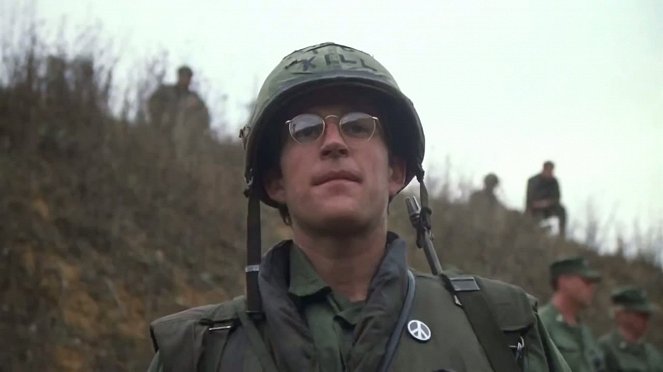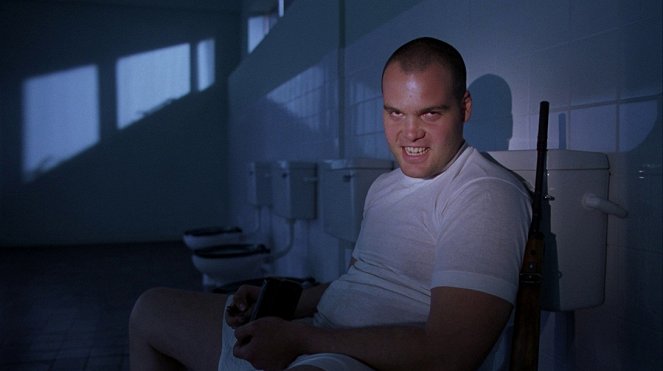Réalisation:
Stanley KubrickPhotographie:
Douglas MilsomeMusique:
Vivian KubrickActeurs·trices:
Matthew Modine, Adam Baldwin, Vincent D'Onofrio, R. Lee Ermey, Dorian Harewood, Arliss Howard, Kevyn Major Howard, Ed O'Ross, John Terry (plus)VOD (4)
Résumés(1)
Au début des années 1960, un groupe de jeunes Marines s’entraîne dans un camp de Caroline du Sud. Parmi les nouvelles recrues se trouvent Joker, Gomer Pyle, Eightball et Cowboy, qui doivent leurs surnoms au tyrannique sergent Hartman dont les humiliations aussi cocasses que cruelles sont leur quotidien. Devenus de véritables soldats formatés, ils sont alors envoyés au combat dans la jungle du Vietnam où ils participent à l’offensive du Têt et plongent dans le véritable enfer de la guerre. (LaCinetek)
(plus)Vidéo (2)
Critiques (12)
La première partie du film, qui nous plonge dans l’entraînement des Marines, est excellente. En fait, il ne s’agit de rien d’autre que d’un sergent hurlant et terrifiant qui pousse les soldats au bout de leurs limites physiques et mentales. Cette partie ne vous laissera pas le temps de respirer : ici, on ne fait que travailler et on n’a même pas le droit de renifler sans permission. Parmi les recrues, il y a le soldat « Grosse Baleine » qui, bien qu’il soit assez lent et toujours à la traîne, a toute mon admiration, car au cours d’un tel entraînement, je me serais évanouie au bout de deux heures, et encore je me vante… Mentalement cependant, il ne s’en tirera pas. L’expression vide et maniaque de son visage me hantera longtemps. Il est juste dommage que le point culminant de cette intrigue n’ait pas pris plus d’essor, cela aurait pu être un excellent sujet pour un autre film. La seconde moitié de Full Metal Jacket ralentit et devient un peu ennuyeuse, mais une fois que l’on entre dans le combat, c’est à nouveau du très bon spectacle. La seule chose étrange, c’est que le film dure un peu moins de deux heures, et bien que je n’aie pas trouvé qu’il traînait en longueur (contrairement à 2001 : l’odyssée de l’espace, où le rythme est plus lent), j’ai eu l’impression qu’il faisait 3 heures environ. Mais peu importe, je l’ai tout de même apprécié.
()
Honestly, it’s no wonder Stone's Platoon did better in its day... Kubrick's Vietnam is less attractive to the viewer's eye, more urban (we don’t get to see any cramped jungles), less action-packed, more protracted and broadly conceived. Yet it is impressive, although dehumanized and cold for my tastes. I consider the introduction and ending of the film to be the best – the marine preparation consists of the constant shouting, the numbing drill and the singing of celebratory songs. All this in the traditionally inventive visual presentation made in Mr. Kubrick (the scene of checking trimmed nails with a double row of privates on boxes is unforgettable). The final sniper scene, on the other hand, is the most personal thing that makes monstrous sense to everything seen so far, and it is one of the most drastic things ever seen in this genre. I consider the most problematic feature of Full Metal Jacket to be the characters, who are too schematic and inconspicuous, but this makes the sheer absurdity and dehumanization of the war stand out all the more. And, of course, Kubrick's sense of the drama of the situation and its visualization. The "period" song soundtrack is also excellent. In summation, Full Metal Jacket is among the films that have a "less attractive" Vietnam for viewers, but in terms of ideas it is among the most interesting.
()
The green-brain one-man-show in the first act is perfect, but as soon as the plot shifts to Vietnam, the film starts to creak. Actually, nothing important happens during those two acts. There is no deeper thought, nothing that would leave me with an emotional experience, which I would expect from a Kubrick film. Moreover, the "Vietnam" locations are rather unconvincing and Kubrick can't do battle scenes. I know better films about the Vietnam war.
()
Stanley Kubrick does attempt to push the boundaries of the genre once again, but it doesn't work out for him in a war film. Despite the surprising first hour, Full Metal Jacket has become by far the director's most unpalatable piece (and therefore considerably un-Kubrick-like), which is killed by the impossibility of identifying with any of the characters.
()
As in the case of the other genres in which Kubrick has worked, his “war movie” ignores the usual techniques, formulas and motifs of the given category and focuses instead on the inner basic principles at their core. Other war and anti-war films put forth glorified or, conversely, disturbing scenes that adhere to the usual imperatives of “War turns boys into men and men into heroes” or “War is hell, or downright evil”. In Kubrick’s view, however, these are overly banal simplifications. Though the narrative of Full Metal Jacket is set in the environment of the Vietnam War, it addresses timeless themes. Kubrick is not interested in the individual soldiers, but in the war and its most destructive weapons, which, however, do not have any triggers or magazines. He explores the military indoctrination machine, depicts it as institutionalised radicalisation and exposes vocabulary and vulgarity as its most powerful tools. It has famously been said that the pen is mightier than the sword, but as R. Lee Ermey demonstrates to us with devastating effect, that statement cannot stand up to the verbal machine gun fired by a drill sergeant. Those who say that military service and war strip people of their personalities and transforms individuals into killing machines may be right, but only on the surface. With chilling dreadfulness, Kubrick makes it clear that the aim of basic training is not to erase a soldier’s personality, but to reprogramme it with extreme macho values, which make such a powerful impression on young men because they draw attention and radiate an impression of strength and self-confidence. The two halves of the film are not only connected, but also absolutely integral to each other. In fact, they do not show any simple “hard in training, easy on the battlefield” attitude, but rather the process by which soldiers adopt and amplify implemented patterns of behaviour as their own. During training, the soldiers do not learn only how to handle their weapons, but also how to project masculinity in its most extreme form. The subsequent episodic scenes set in Vietnam have a common denominator in the macho peacocking, when it all comes down to not losing face in front of one’s adversary, which means one-upping each other with the greatest excess possible. Fittingly (until the end), the adversary is no one in particular from the other side of the conflict, but just more Americans indoctrinated into the ideology of machismo. Feathers are initially ruffled only with vulgarities, but that soon becomes insufficient and the need to demonstrate dominance leads to real excesses, cruelties and atrocities. By pointing out the connection between indoctrination and the performance of machismo with its verbal manifestations, Kubrick created a disturbing and unfortunately timeless work. Though Full Metal Jacket is set in a training camp and war zone, the same tools are being used today in the macho indoctrination and radicalisation of young men on social media.
()



Annonces